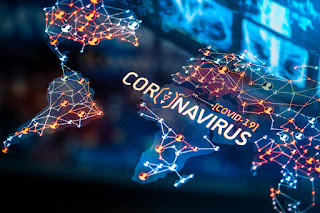THIS PANDEMIC (CAMPUS NIGERIA 2020 ARTICLE CONTEST SHORTLISTED ENTRY)
Who would have thought of a time when security officers would check the temperature of Chief Medical Officers or when Nigerian political leaders would be forced to receive medical treatments within the country? These and many more ironical questions were dismissed at the advent of the Coronavirus Disease 2019 (COVID-19). First identified in Wuhan, China, COVID-19 was initially reported to the World Health Organization (W.H.O) on 31st December, 2019. On 30th January, 2020, W.H.O declared the COVID-19 outbreak a global emergency. On 11th March, 2020, W.H.O declared COVID-19 a global pandemic [due to its rapid spread across every continent except Antartica] (Cennimo, 2020). Seven types of coronaviruses have been identified; they spread through the air; personal contacts; touching contaminated objects or surfaces and rarely, by fecal contamination and have symptoms ranging from runny nose, sore throat, loss of taste, cough and fever among others.
The illness is caused by novel coronavirus, Severe Acute Respiratory Syndrome Coronavirus 2 (SARS-CoV-2). Agedness, kidney disease, obstructive pulmonary disease, a weakened immune system, obesity, heart conditions, sickle cell and diabetes among othersincrease the risk of a serious illness with this virus. As at 8th August, 2020, there were over 19.4 million confirmed cases; over 11.7 million recovered and over 721,000 deaths and counting, globally. In Nigeria, there were over 46,000 confirmed cases; over 32,000 recovered and over 940 deaths and counting (Wikipedia, 2020).
The damages of the COVID-19 cannot be overemphasized. The need for remuneration despite low productivity; purchase of healthcare materials and other expenses have placed a financial burden on the world. Judging from statistics also, COVID-19 has directly and indirectly (by diverting attention from other pressing medical challenges) spiked mortality rates across the world. Also, the imposed lockdown in different countries has caused a social and mental distance between people.
In lamenting this situation, however, it will be wise to scavenge through the rubbles of damage for treasures possibly hidden therein. One of such is the opportunity to re-assess the degree of our vulnerability in the face of unexpected shocks of this nature and make necessary changes.
Also, the virus has laid religious, ethnic and political stratifications to an indefinite rest as the need to battle a common enemy is now being realized. In addition, the lockdown has created awareness of earlier unexploited technological possibilities. Different professionals have set up efficient workplaces in their homes. As this continues, there will be reduced traffic congestion, accidents and stress levels, among others. In a bid to develop stronger immunity also, many people have developed healthy lifestyles. Familial bonding has also improved.
Among all these, popular Nigerian singer-songwriter, Rema, observed, “The world paused so you could catch up.” Therefore, in obeying all the safety measures that the media regularly brings to our knowledge, we should not ignore self-development. Also, we should not forget António Guterres’ counsel: “Now is the time for unity, for the international community to work together in solidarity to stop this virus and its shattering consequences.”
References
1. Cennimo D.J. (2020). What is COVID-19? Available at: https://www.medscape.com/answers/2500114-197401/what-is-covid-19 (Accessed: 8th August, 2020)
2. ‘Template: COVID-19 pandemic data’ (2020). Wikipedia. Available at: https://en.wikipedia.org/wiki/Template:COVID-19_pandemic_data (Accessed: 8th August, 2020)


.jpeg)
Comments
Post a Comment
I would absolutely love to know your thoughts about this!